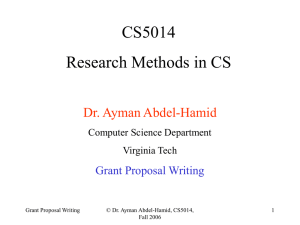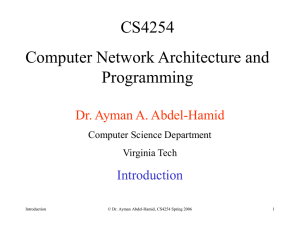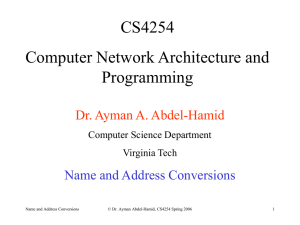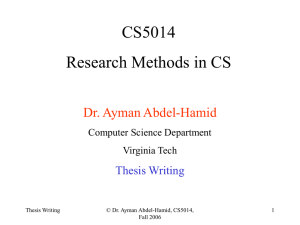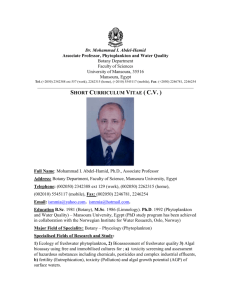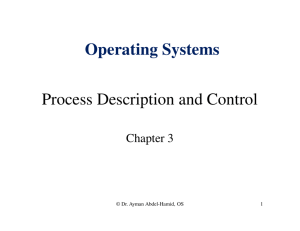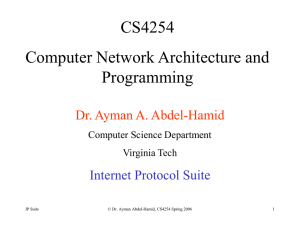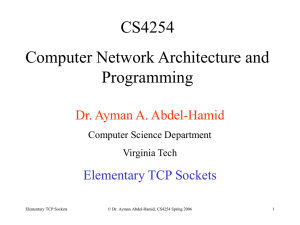Security Services (X.800) - People
advertisement
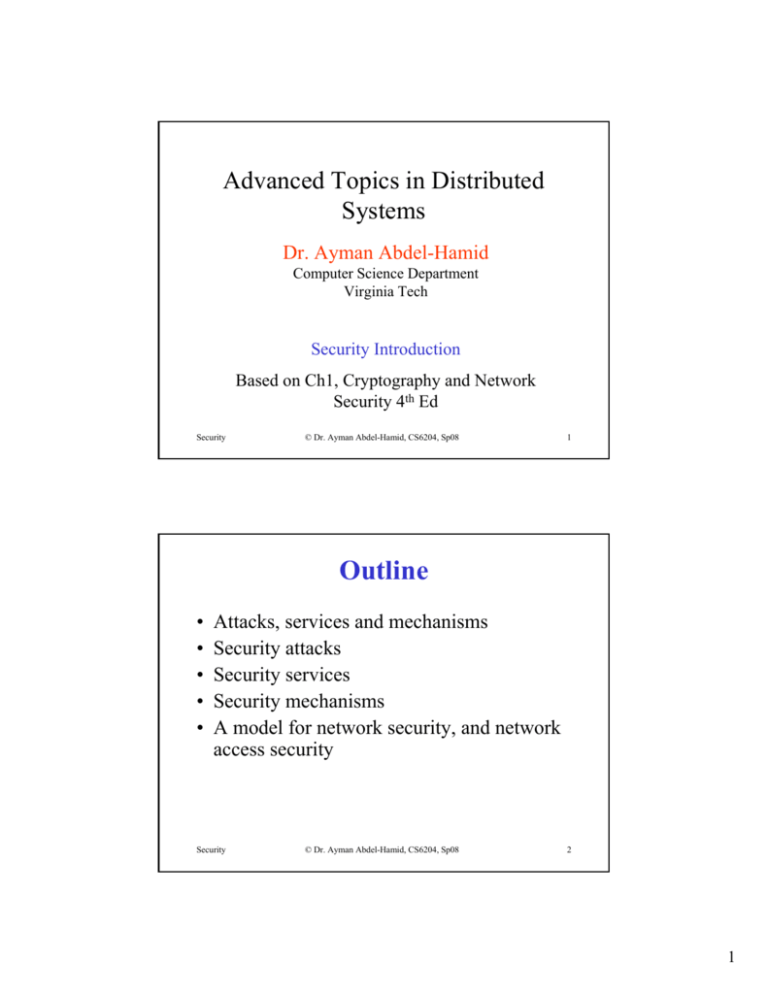
Advanced Topics in Distributed Systems Dr. Ayman Abdel-Hamid Computer Science Department Virginia Tech Security Introduction Based on Ch1, Cryptography and Network Security 4th Ed Security © Dr. Ayman Abdel-Hamid, CS6204, Sp08 1 Outline • • • • • Attacks, services and mechanisms Security attacks Security services Security mechanisms A model for network security, and network access security Security © Dr. Ayman Abdel-Hamid, CS6204, Sp08 2 1 Background • Information Security requirements have changed in recent times • traditionally provided by physical and administrative mechanisms • computer use requires automated tools to protect files and other stored information • use of networks and communications links requires measures to protect data during transmission Security © Dr. Ayman Abdel-Hamid, CS6204, Sp08 3 Definitions • Computer Security - generic name for the collection of tools designed to protect data and to thwart hackers • Network Security - measures to protect data during their transmission • Internet Security - measures to protect data during their transmission over a collection of interconnected networks Security © Dr. Ayman Abdel-Hamid, CS6204, Sp08 4 2 Possible Security Violations • A transmits a file to B. C (not authorized to read the file) monitors transmissions and captures a copy • D transmits a message to computer E, instructing E to update an authorization file. User F intercepts the message, alters its contents to add or delete entries and forward to E which accepts the message as being from D • User F constructs its own message and transmits to E as if coming from D • Denying sending a message Security © Dr. Ayman Abdel-Hamid, CS6204, Sp08 5 Services, Mechanisms, Attacks • Need systematic way to define security requirements • Consider three aspects of information security: – security attack ¾action that compromises the security of information owned by an organization – security mechanism ¾Designed to detect, prevent, or recover from a security attack – security service ¾Enhances the security of data processing systems and information transfers of an organization • Consider in reverse order Security © Dr. Ayman Abdel-Hamid, CS6204, Sp08 6 3 Security Service • enhances the security of the data processing systems and the information transfers of an organization • intended to counter security attacks • make use of one or more security mechanisms to provide the service • replicate functions normally associated with physical documents ¾e.g., have signatures, dates; need protection from disclosure, tampering, or destruction; be notarized or witnessed; be recorded or licensed (problems with electronic documents) Security © Dr. Ayman Abdel-Hamid, CS6204, Sp08 7 Security Mechanism • a mechanism that is designed to detect, prevent, or recover from a security attack • no single mechanism that will support all functions required • however one particular element underlies many of the security mechanisms in use: cryptographic techniques Security © Dr. Ayman Abdel-Hamid, CS6204, Sp08 8 4 Security Attack • Any action that compromises the security of information owned by an organization • information security is about how to prevent attacks, or failing that, to detect attacks on information-based systems • have a wide range of attacks • can focus of generic types of attacks • note: often threat & attack mean same Security © Dr. Ayman Abdel-Hamid, CS6204, Sp08 9 OSI Security Architecture • ITU-T (International Telecommunication Union, Telecommunication Standardization Sector) X.800 Security Architecture for OSI • defines a systematic way of defining and providing security requirements Security © Dr. Ayman Abdel-Hamid, CS6204, Sp08 10 5 Security Service • X.800 defines it as: a service provided by a protocol layer of communicating open systems, which ensures adequate security of the systems or of data transfers • RFC 2828 defines it as: a processing or communication service provided by a system to give a specific kind of protection to system resources • X.800 defines it in 5 major categories Security © Dr. Ayman Abdel-Hamid, CS6204, Sp08 Security Services (X.800) 11 1/7 • Authentication - assurance that the communicating entity is the one claimed • Access Control - prevention of the unauthorized use of a resource • Data Confidentiality –protection of data from unauthorized disclosure • Data Integrity - assurance that data received are exactly as sent by an authorized entity • Nonrepudiation - protection against denial by one of the parties in a communication • What about Availability? Security © Dr. Ayman Abdel-Hamid, CS6204, Sp08 12 6 Security Services (X.800) 2/7 • Authentication - assurance that the communicating entity is the one claimed ¾Peer Entity Authentication 9Confidence in the identities of entities connected (corroboration of identity of peer entity in an association) 9Used at establishment of connection, and during data transfer phase ¾Data-Origin Authentication 9Source of received data is as claimed Security © Dr. Ayman Abdel-Hamid, CS6204, Sp08 Security Services (X.800) 13 3/7 • Access Control - prevention of the unauthorized use of a resource ¾Who can have access to a resource? ¾Under what conditions? ¾If you are granted access, what are you allowed to do? Security © Dr. Ayman Abdel-Hamid, CS6204, Sp08 14 7 Security Services (X.800) 4/7 • Data Confidentiality –protection of data from unauthorized disclosure ¾Connection Confidentiality 9All user data is protected ¾Connectionless Confidentiality 9All user data in a single data block is protected ¾Selective-Field Confidentiality ¾Specific fields are protected ¾Traffic-flow Confidentiality 9Protecting traffic flow from analysis Security © Dr. Ayman Abdel-Hamid, CS6204, Sp08 Security Services (X.800) 15 5/7 • Data Integrity - assurance that data received are exactly as sent by an authorized entity (no modification, insertion, deletion, or replay) ¾Connection Integrity with Recovery ¾Connection Integrity without Recovery ¾Selective-field Connection Integrity ¾Connectionless Integrity ¾Selective-Field Connectionless Integrity Security © Dr. Ayman Abdel-Hamid, CS6204, Sp08 16 8 Security Services (X.800) 6/7 • Nonrepudiation - protection against denial by one of the parties in a communication ¾Nonrepudiation, Origin ¾Nonrepudiation, Receiver Security © Dr. Ayman Abdel-Hamid, CS6204, Sp08 17 Security Mechanisms (X.800) 7/7 • specific security mechanisms: – encipherment, digital signatures, access controls, data integrity, authentication exchange, traffic padding, routing control, notarization • pervasive security mechanisms: – trusted functionality, security labels, event detection, security audit trails, security recovery • Others not included here? Security © Dr. Ayman Abdel-Hamid, CS6204, Sp08 18 9 Classify Security Attacks as • passive attacks - eavesdropping on, or monitoring of, transmissions to: – obtain message contents, or – monitor traffic flows – Difficult to detect since no alteration of data • active attacks – modification of data stream, or creation of a false stream – – – – Security masquerade of one entity as some other replay previous messages modify messages in transit denial of service © Dr. Ayman Abdel-Hamid, CS6204, Sp08 Model for Network Security Security © Dr. Ayman Abdel-Hamid, CS6204, Sp08 19 1/2 20 10 Model for Network Security 2/2 • using this model requires us to: – design a suitable algorithm for the security transformation – generate the secret information (keys) used by the algorithm – develop methods to distribute and share the secret information – specify a protocol enabling the principals to use the transformation and secret information for a security service Security © Dr. Ayman Abdel-Hamid, CS6204, Sp08 21 Network Access Security Model 1/2 Security © Dr. Ayman Abdel-Hamid, CS6204, Sp08 22 11 Network Access Security Model 2/2 • using this model requires us to: – select appropriate gatekeeper functions to identify users – implement security controls to ensure only authorised users access designated information or resources • trusted computer systems can be used to implement this model Security © Dr. Ayman Abdel-Hamid, CS6204, Sp08 23 Further Reading • RFC 2828 (Informational), Internet Security Glossary, available at http://www.ietf.org Security © Dr. Ayman Abdel-Hamid, CS6204, Sp08 24 12

